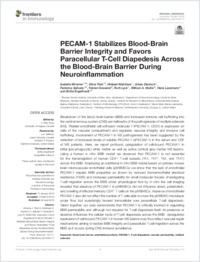PECAM-1 stabilizes blood-brain barrier integrity and favors paracellular T-Cell diapedesis across the blood-brain barrier during neuroinflammation
- Wimmer, Isabella Theodor Kocher Institute, University of Bern, Switzerland - Department of Neuroimmunology, Center for Brain Research, Medical University of Vienna, Austria
- Tietz, Silvia Theodor Kocher Institute, University of Bern, Switzerland
- Nishihara, Hideaki Theodor Kocher Institute, University of Bern, Switzerland
- Deutsch, Urban Theodor Kocher Institute, University of Bern, Switzerland
- Sallusto, Federica Institute for Research in Biomedicine (IRB), Faculty of Biomedical Sciences, Università della Svizzera italiana, Switzerland - Institute of Microbiology, ETH Zürich, Switzerland
- Gosselet, Fabien Blood-Brain Barrier Laboratory, Université d'Artois, Lens, France
- Lyck, Ruth Theodor Kocher Institute, University of Bern, Switzerland
- Muller, William A. Feinberg School of Medicine, Northwestern University, Chicago, IL, United States
- Lassmann, Hans Department of Neuroimmunology, Center for Brain Research, Medical University of Vienna, Austria
- Engelhardt, Britta Theodor Kocher Institute, University of Bern, Switzerland
-
05.04.2019
Published in:
- Frontiers in immunology. - 2019, vol. 10, p. 711
Blood-brain barrier
Endothelial junctions
PECAM-1
T-cell diapedesis
Vascular permeability
Multiple sclerosis
English
Breakdown of the blood-brain barrier (BBB) and increased immune cell trafficking into the central nervous system (CNS) are hallmarks of the pathogenesis of multiple sclerosis (MS). Platelet endothelial cell adhesion molecule-1 (PECAM-1; CD31) is expressed on cells of the vascular compartment and regulates vascular integrity and immune cell trafficking. Involvement of PECAM-1 in MS pathogenesis has been suggested by the detection of increased levels of soluble PECAM-1 (sPECAM-1) in the serum and CSF of MS patients. Here, we report profound upregulation of cell-bound PECAM-1 in initial (pre-phagocytic) white matter as well as active cortical grey matter MS lesions. Using a human in vitro BBB model we observed that PECAM-1 is not essential for the transmigration of human CD4+ T-cell subsets (Th1, Th1*, Th2, and Th17) across the BBB. Employing an additional in vitro BBB model based on primary mouse brain microvascular endothelial cells (pMBMECs) we show that the lack of endothelial PECAM-1 impairs BBB properties as shown by reduced transendothelial electrical resistance (TEER) and increases permeability for small molecular tracers. Investigating T-cell migration across the BBB under physiological flow by in vitro live cell imaging revealed that absence of PECAM-1 in pMBMECs did not influence arrest, polarization and crawling of effector/memory CD4+ T cells on the pMBMECs. Absence of endothelial PECAM-1 also did not affect the number of T cells able to cross the pMBMEC monolayer under flow, but surprisingly favored transcellular over paracellular T-cell diapedesis. Taken together, our data demonstrate that PECAM-1 is critically involved in regulating BBB permeability and although not required for T-cell diapedesis itself, its presence or absence influences the cellular route of T-cell diapedesis across the BBB. Upregulated expression of cell-bound PECAM-1 in human MS lesions may thus reflect vascular repair mechanisms aiming to restore BBB integrity and paracellular T-cell migration across the BBB as it occurs during CNS immune surveillance.
- Language
-
- English
- Classification
- Pathology, clinical medicine
- License
- Open access status
- gold
- Identifiers
-
- RERO DOC 327027
- DOI 10.3389/fimmu.2019.00711
- ARK ark:/12658/srd1319145
- Persistent URL
- https://n2t.net/ark:/12658/srd1319145
Statistics
Document views: 235
File downloads:
- Fulltext: 277
